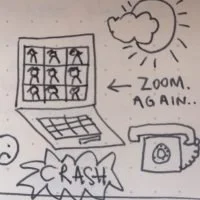Access is kindness, by Lisette Auton, May 2020
The Inaccessibility of the Future (or, What To Do When You Just Can’t Zoom)
There are incredible articles in the internet-verse about Zoom fatigue, about access, about connectivity for those where physical access to space was impossible, about people meeting and connecting from all over the world. I don’t intend to duplicate those here.
I want to ask the question, what if you can’t Zoom? What if you can’t do any form of group meeting online? AT ALL.
I always get a worry in my tummy when I’m about to say how I feel, that it may be dismissed or seen as combative. I’m learning to listen to my tummy at the moment, it’s nearly always right (need for biscuits, bad men, dubious work decisions) so in order to placate it, let’s begin with the following:
1) I speak only for myself, but hope that others feeling the same may find a beginning or solidarity.
2) It is not an attack on those doing wonderful work in extraordinary circumstances, it is a question about kindness and how we can be together.
The world has changed. Especially for those of us in the arts. For now? For how long? I don’t know those answers, all I know is that I don’t think I have ever felt so lonely, so missing.
I lost my Zoom-ginity and had my first time group experience on the 1st April 2020. I should have been at Northern Stage performing in Vital Xposure’s Medicine’s Monstrous Daughters on the second week of our national tour. I wasn’t. I wasn’t in my office. I was at home dealing with how to work, and is there any work, and stress, and the noise of the boiler in the little room that I’m now using to write which turns out plunges me in darkness then overexposure on a second by second cycle due to the position of the window.
It was odd.
Seeing all these people I knew in a rehearsal room now placed within their home environments. It was heart breaking that we weren’t together where we should have been. But at least there was a way to try and support each other, to laugh, to plan. Oh my goodness, I’d missed laughter and silliness. I’d missed people! Wondrous, kind, funny, joyous, creative people bouncing off each other. Laughter. I had forgotten all their laughs.
I felt weird afterwards, out of body, and put it down to how surreal it felt, went on with my day.
I had my last group Zoom/Skype/Teams/WhatsApp/Messenger/Google Meet on the 20th April 2020 and then spent the next five days in bed.
I haven’t been part of a group meeting since.
It has to be said, I feel/felt (is this past-participle time yet? Be honest, Lisette.) a failure. Again.
I mean, it’s dead easy, innit? You turn your laptop on, make sure it’s on wiffy, go to the correct website or app, sign in, put in IDs or passwords or follow links and turn on your audio and camera and then there you are, let’s begin – ta dah!
Let’s break that sentence down:
Do you have a safe, quiet space? Do you feel okay showing the inside of your home? Do you have a home?
Do you have any technology that works – smartphone, laptop, desktop? Is your device too old and glitchy to run the meeting programme? Can we hear you on your microphone? Do your children need to use it right now?
Do you have access to reliable Wi-Fi? Can you afford it? Is there enough bandwidth to share around with all of you now working and schooling from home? Does your rural area have it, because now you can’t escape to the coffee shop or office? What if your only space to access the internet was the now closed library?
Are you able to create an account with a multitude of multiple mediums for meetings? Are you able to follow the instructions to log on or get your camera working? Is this all just incomprehensible gobbledygook and you feel silly asking again so you’ll just pretend you can’t make it?
Can you follow what’s happening without BSL or captions or facial cues or audio description or when there are lags and everyone overlaps? Is this causing too much anxiety?
Are you still working so can’t be involved with any of these shenanigans because you’re either at work, eating, sleeping, begin cycle again?
Are you overwhelmed and exhausted by the sheer amount of time now spent in front of a screen?
Do you feel like the only one in the world whose eyes dart around the screen and then there’s vertigo and nausea and sickness and now it happens immediately and you can’t afford five days of horizontal dark room recovery so you’ll just retreat quietly away like you once had to do twenty years ago and it hurts and you feel lonely and like the world will move on without you and forget you and you’re missing out on so very much?
The movement online is wondrous in so many ways. Poetry slams are being attended by people from all over the world. There is no need to rely on rubbish building access information only to arrive and find out it is accessible if you don’t mind being seated away from all of your friends and you can’t have a wee all night because the loo is down a flight of stairs. There is so much I ruddy love about the opening up of the world! But….
….I think we may have forgotten that access is love and kindness. That there is not one size fits all. There never will be, and that’s okay. That access is a continual evolutionary and creative way of being. That there is no solution which will fit everybody all of the time, and we will continue to search for multiple solutions and multiple ways of being with no hierarchy until we can all be equally together. We should celebrate difference and multiple ways to connect.
We know that, don’t we? DON’T WE?
What frightens me at the moment is the way that so many of the group events happening, especially about the creative world in which I live and thrive and breathe, which are inaccessible to so many people for so many different reasons, are billed as building THE FUTURE.
We just can’t build a future for the arts whilst leaving people behind. We cannot set out into a brave new world without taking everyone with us.
We have done that too many times to too many different groups of people, some may say we still do.
We are, we should be, in this together. We are not okay until we’re all okay.
I do not have the solution. Sorry. Were you expecting that having read this far? I really wish I did. This is the beginning of a conversation, not an answer. But you’re a clever, creative lot out there, full of heart and wonder, surely we can work this out together?
The things I have learnt thus far through trial and error, tears and wonderful conversations and would like to share are:
1) Captions and/or BSL – make it happen. As standard. Cost is an issue. I know this. Cost is always an issue. Tough. We need to work out a way that this is maintained in both the virtual and real world. Baseline. Full stop. Build it in to budgets as a non-negotiable.
2) Audio description – begin with your name. It locates and grounds a conversation. Do it.
3) Don’t stop inviting people to things because they can’t attend. Don’t pretend it’s not happening. I’m down with the kids, I’ve discovered FOMO*, it hurts.
4) Record content, let those attending know that content will be recorded. It means that people can catch up in their own time if they weren’t able to attend, if attention waned, or the hamster escaped. Or if they can only attend for a short while.
5) If this is a private meeting and the content is not intended to be available to the public and purely for those that attended, open that up to those that were invited, make sure that those in attendance know that there are others that wanted to be there but couldn’t, that they will be given a copy.
6) If there is networking then, with permission, say the names and brief description of those who could not be there, keep their names and work alive. Send out a list of (non) attendees with their website or contact links.
7) If there are to be presentations, consider using pre-recorded material from those who can’t be there, or reading out their words.
8) Use snail mail, phone calls, pigeon, anything necessary to ensure those who are not there can be represented and informed and not left out, left behind.
9) Take a group photo with permission. Those who don’t want that, that’s fine, turn off your cameras. Wave. Smile. I miss a sea of faces. Send me your faces.
10) Have an idea of what’s going to happen beforehand and send it out. Ask those who can’t attend if they’d like to contribute. Make that contribution and name known, with permission.
11) Make brief minutes of what occurred (please add in the jokes and loveliness) and send out to those who couldn’t be there. Give space for those missing to contribute to this too.
12) Ask, does this meeting have to be in this format?
13) Dialogue. Perpetual, open, dialogue.
I miss you.
I miss you plural.
I feel like a missing.
I said I would never be a missing again.
I said I’d never leave anyone behind. I mess that up all the time. But I own up to it, ask, think, learn, apply, stuff up again, ask again. As long as access is done with kindness and love and willingness to learn and adapt then I do not believe that there is any space for animosity and aggression.
I do hope that you know I don’t feel angry towards you. I just feel a bit sad, and left out, and sad for all those who must be feeling the same.
We are creatives. We are used to problem solving with no money, no time, and the audience about to enter…
Could we please work this out together? Work out the future together.
Make sure no one is left behind, make sure no one is missing.
*FOMO – fear of missing out. Exactly what would have happened without this asterisk and handy explanatory note.
image description: Lisette in a purple t-shirt which reads ‘disability is not a bad word’, holding her purple walking stick with her eyes and mouth wide open. photo credit: Laura Tindall at PaperBoat Photography
image description: section of Lisette’s doodle diary drawn in black pen. A doodle of a sun and cloud, a telephone, a laptop with multiple heads in a screen with an arrow saying ‘ZOOM. AGAIN…’, a sad face, and the word CRASH in a spiky bubble.
image description: Lisette in red, yellow and black circus ring mistress outfit with black top hats stands with hands outstretched, eyes crumpled up tight and mouth wide open in anger. photo credit: taken at the Disconsortia DIY Cabaret by Kev Howard
About Lisette
Lisette Auton does stuff with words: disabled writer, activist, poet, spoken-word artist, actor, theatre-maker and creative practitioner. She’s an award-winning published poet, a Penguin WriteNow mentee, recipient of an Early Careers Residency for Literature at Cove Park, and on the TSS Publishing list of Best British & Irish Flash Fiction. She uses her platform as a performer, writer and theatre-maker to make the invisible visible. www.lisetteauton.co.uk
This blog was commissioned thanks to support from Arts Council England’s emergency recovery package.




